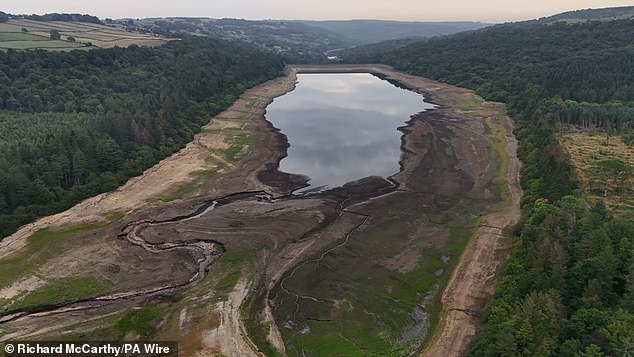They’re the government body behind the dreaded hosepipe bans.
But the Environment Agency have come up with another way to save water – by deleting old emails.
Historic messages and photos are stored in vast data centres which consume so much energy they require large amounts of water to keep cool.
Now, the public is being urged to ‘play their part’ to help reduce pressure on our water systems by having an email clear–out.
The advice was issued as Britain endures its fourth heatwave of the summer. Five areas of England are currently officially in drought, with six more in ‘prolonged dry weather’.
‘The current situation is nationally significant, and we are calling on everyone to play their part and help reduce the pressure on our water environment,’ Helen Wakeham, the Environment Agency’s director of water, said.
‘We are grateful to the public for following the restrictions, where in place, to conserve water in these dry conditions.
‘Simple, everyday choices – such as turning off a tap or deleting old emails – also really helps the collective effort to reduce demand and help preserve the health of our rivers and wildlife.’

An aerial photo showing low water levels at Broomhead Reservoir in South Yorkshire on August 12, 2025

The near–barren Baitings Reservoir in Yorkshire on August 8, 2025. Experts have warned that reservoir levels continue to recede despite some rainstorms and showers in July
Other pieces of advice for the British public include fixing a leaky toilet, which can waste up to 400 litres a day, and turning off the taps when brushing teeth or shaving.
The Environment Agency also recommends installing a rain butt to collect rainwater to use in the garden, and taking shorter showers.
‘The less water that is used, the less needs to be abstracted from local rivers – therefore protecting the health of our waterways and wildlife,’ the agency said in a statement.
Experts have warned that many river flows and reservoir levels continue to recede – despite some rainstorms and showers in July – and that August has started to see a return of drier conditions.
Temperatures are expected to soar to the mid–30s this week, during yet another bout of unusually warm weather.
This month also marks the six consecutive month of below–average rainfall, with the rivers Wye and Ely Ouse recording their lowest ever records for July.
Hosepipe bans are still in place for all Yorkshire Water customers along with some customers of Thames Water, South East Water and Southern Water.
Chief Meteorologist at the Met Office, Dr Will Lang said: ‘This week is starting off warmer than of late across England and Wales with temperatures getting towards the mid–30s Celsius for some in the south.

Google is building a massive data centre in Hertfordshire. The site is 33 acres large and will power services such as Maps and the Cloud

The public is being urged to ‘play their part’ to help reduce pressure on our water systems by having an email clear–out (stock image)
‘While conditions remain mostly settled across the south, the picture is more unsettled further northwest, with rain or showers at times.
‘As we move into the second half of August, there are indications of high pressure building and therefore largely settled conditions overall.
‘Although dry weather is more likely, rain, showers or thunderstorms cannot be ruled out.’
Experts have previously warned that Prime Minister Sir Keir Starmer’s plan to make the UK a ‘world leader’ in artificial intelligence (AI) could put already stretched supplies of drinking water under strain, due to the amount needed to prevent data centres from overheating.
However, the tech industry says it is developing more efficient cooling systems that use less water.
Data centres use fresh, mains water, rather than surface water, so that the pipes, pumps and heat exchangers used to cool racks of servers do not get clogged up with contaminants.
The amount used can vary considerably depending on a range factors including the surrounding environment – sites in colder, wetter parts of the world tend to require less.
Dr Venkatesh Uddameri, a Texas–based expert in water resources management, previously said a typical data centre can use between 11 million and 19 million litres of water per day, roughly the same as a town of 30,000 to 50,000 people. His widely quoted calculations are based on arid, or semi arid, climates and do not take into account recent efficiency improvements or developments in AI.
This article was originally published by a www.dailymail.co.uk . Read the Original article here. .

